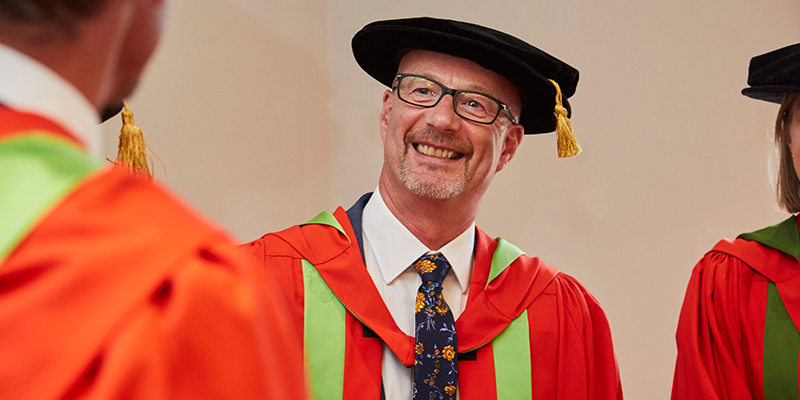Peter John Gibbs

Presentation address by Professor Stephen Scott
Chancellor,
Peter Gibbs was brought up in the Lake District, where his love of the outdoors fed an interest in weather. His earliest weather memory is of his father digging through a roof-high snowdrift in 1962-63.
Peter’s career as a meteorologist began in 1979. After graduating in Physics and Geography, he spent over two years in the Antarctic with the British Antarctic Survey. In Spartan living conditions and near-isolation, Peter was responsible for meteorological observations at Ice Station Halley on the Brunt Ice Shelf – collecting data which contributed to the discovery of the ozone hole – and was base commander in the second year. That was a year marked by a fire in a hydrogen generator shed – rumours persist which link Peter, a towel and a radiator – and, aptly, by extreme weather: 198 days of falling snow, 222 days of drifting snow (a record at the time) and a record low temperature, of minus 41C.
Peter joined the Met Office in 1982, where his career included forecasting for Tornado jet pilots, for rocket trials in the Outer Hebrides and for chicken farmers in Norfolk.
Peter’s television debut in 1993 was with BBC Norwich's Look East; he moved to the BBC’s Weather Centre in London in 1997. When he left the BBC in 2016, he had broadcast across all BBC channels. He continues to appear on Radio 4, on Gardeners’ Question Time and Costing the Earth in particular.
Peter returned to Antarctica in 2016, reporting for the BBC’s Horizon programme on the Halley Station’s work on long-term changes to the atmosphere and climate. The landscape looked the same but the station was much altered. Modern communications had reached Antarctica, and the poorly-heated wooden huts inside steel tubes were long gone.
Now a freelance broadcaster, Peter maintains his interest in climate change. He works with several organisations on modernising and improving access to weather and climate services across Africa, potentially benefiting smallholder farmers. He retains strong links with the scientific community through his work with the Royal Meteorological Society, of which he is a Fellow.
Peter has said that his biggest ambition is to fly through the eye of a hurricane. We hope he fulfils it, and his second biggest ambition – to come back.
Chancellor, it is my very great pleasure to present to you for the degree of Doctors of Laws, honoris causa: Peter John Gibbs.